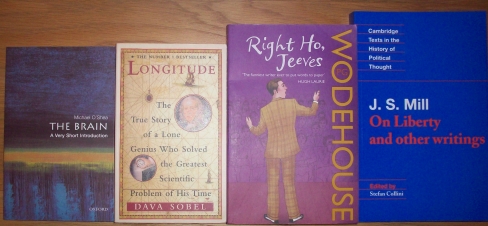So this is an experiment, inspired entirely by watching Tash this morning, at reviewing the books I’ve read during 2011 so far. My tastes are perhaps rather eccentric, so this may not be of much interest to anyone, but let’s give it a whirl. After all, since there are way too many interesting books to read in the world today, and far too little time to read anything at all, perhaps you can treat reading this review as sorta equivalent to actually having read these yourselves? Maybe?
Also, I’m putting off tidying my floor.

The Brain; Longitude; Right Ho, Jeeves; On Liberty and other writings
I’m rather addicted to the Very Short Introduction series even though I remember little of the detail after finishing, and thus the attempt to be more scientifically literate doesn’t always progress much. Still, the brain is fascinating enough to read about repeatedly, and this book helpfully devotes a decent chunk of time just trying to establish the basics of how neurons actually work. Frustratingly, of course, some of the bigger questions about how consciousness as a whole physically comes about remain largely unanswered, and I very much hope that I’ll be able to read an updated edition in 50 years’ time summarising our further leaps in understanding. In the meantime, this is a primer to the usual high standards of the Very Short Introductions, although not quite as ‘fun’ as the still-extraordinary Phantoms in the Brain. And you know you’re in safe hands with a book which stridently sets out the ‘purely material terms’ of the discussion in the very first paragraph: no messing about with spirituality here.
Longitude – Dava Sobel
I read this as part of my quest to finally get through some books which have been sitting on my shelf for years. The story of eighteenth century clockmaker John Harrison and his life’s work building clocks accurate enough to determine longitude at sea, its greatest attribute is stimulating an appreciation of just how many people in the past worked their little socks off in cumulatively bringing us to where we are today. I mean, this guy really did care about his clocks, and hats off to him for that. The tone is breezy and easy to read – certainly no bad thing – although the narrative quest for heroes and villains does result in a number of people trotted out to be the ‘bad guys’, thwarting our ‘lone genius’ out of jealousy or contempt or bitterness, who unfortunately don’t seem capable of much more serious villainy than perhaps keeping his clock in the sun for too long. Still, sometime it’s nice to read history on a human-scale, and this book won’t demand much of your time in return for making you a lot more knowledgeable about sea clocks.
Right Ho, Jeeves – P.G. Wodehouse
Sublime. I’d never read any Wodehouse before, nor seen any adaptations, but this has instantly converted me into a fan. I sense that some people are turned off by a book set entirely in an inter-war bubble of insufferably posh idiots. Wodehouse is consistently mocking, of course, but it’s certainly very ‘gentle’ (as my dad said a little dismissively) and inclined to leave you walking around for days muttering ‘tush!’ and ‘what ho!’ at the earliest opportunity. Is this inculcating a romantic attachment to a pretty unattractive world of, as previously mentioned, insufferably posh idiots? No, it isn’t. It’s just funny, OK? Beautifully written, wonderfully unstated and hilarious… give it a try, and leave the searing social critique for some other writer in some other book. Right ho, Jeeves!
On Liberty and other writings – J.S. Mill
Toby Young makes a habit of saying ridiculous things, but one of his more outlandish theories revolves around the learning of Latin being necessary because it ‘teaches you to think’ and ‘argue logically’ and ‘swim 200 metres backstroke’ and so on. It’s a shame, not only because it demeans Latin, but also because it implies that English is somehow deficient as a language of serious thought. Reading J.S. Mill might cure him of this illusion. There are three works included here: ‘On Liberty’ (1859), ‘The Subjection of Women’ (1869) and his posthumous drafts of ‘Chapters on Socialism’. Mill was progressive enough to render him immediately likeable to a modern audience, even if you don’t agree with everything he says, and his writing style smacks of a fair-minded consideration of the arguments melded together with passionate force in articulating what he believes. (The defence of freedom of speech in ‘On Liberty’ is particularly good.) I found the final ‘Chapters on Socialism’ the most interesting, actually, mostly because I think they would pass the ‘Saoirse test’: a discussion thoughtful enough not to prompt a metaphorical shot to the head. It was the following line from ‘On Liberty’, however, which had me beaming with nerdy political thought love:
“It is a piece of idle sentimentality that truth, merely as truth, has any inherent power denied to error, of prevailing against the dungeon and the stake.”









